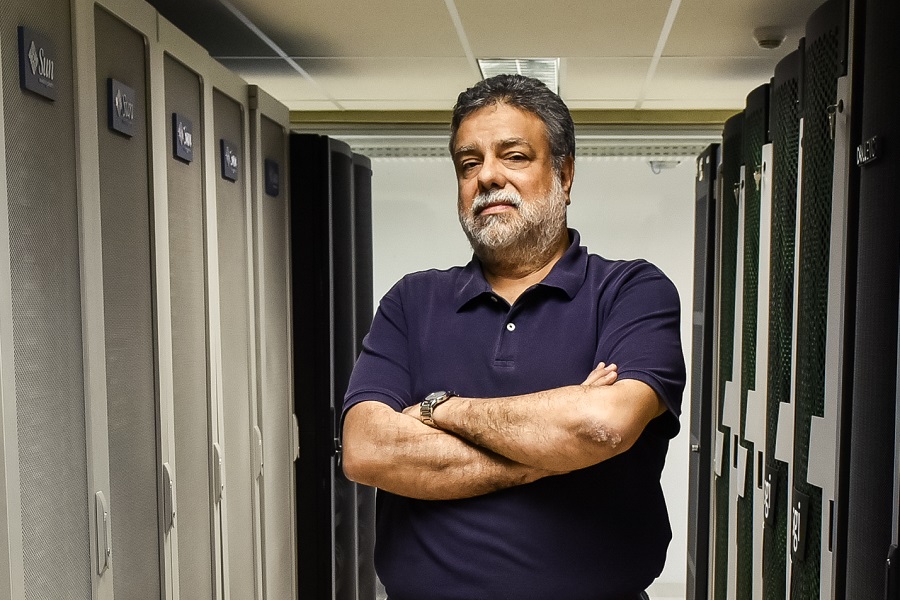Center of Excellence in Machine Learning (CoE-ML) — developed by Unesp researchers — aims to transform the market through Artificial Intelligence partnerships and solutions. Reducing the gap in the relationship between universities and the market, facilitating financial support for developing artificial intelligence projects, and enabling knowledge about AI to reach more people and areas of society; these are the three objectives of the Center of Excellence in Machine Learning (CoE-ML), coordinated by the director of the Scientific Computation Center of the Universidade Estadual Paulista, UNESP professor Sérgio Novaes.
Reducing the gap in the relationship between universities and the market, facilitating financial support for developing artificial intelligence projects, and enabling knowledge about AI to reach more people and areas of society; these are the three objectives of the Center of Excellence in Machine Learning (CoE-ML), coordinated by the director of the Scientific Computation Center of the Unesp Brazil, Dr. Sérgio Novaes.
The innovative project—started in 2017—currently has 20 researchers working on it, linked to seven Brazilian universities. They are mainly physicists, mathematicians, engineers, and computer scientists. “We want both experts from academia and companies. This group has every chance to presenting solutions using artificial intelligence,” explains professor Novaes, one of Brazil’s most famous physicists. He spent time as guest researcher at several research institutions abroad, including Lawrence Berkeley National Laboratory—where he obtained his post-PhD—and the Fermi National Accelerator Laboratory, both in the United States.

The group’s proposal is to focus on projects and partnerships that have significant and provable socio-economic impact. “It’s not about using researchers and investment simply to solve a problem a company might be having at the time,” explains Novaes. Likewise, the project is not just theoretical research. Once a demand in the market or in academia has been identified, researchers in the group work as mentors, involving other scientists in the field—academics or otherwise—in search for a solution. The project includes masters, doctoral, and postdoctoral students, although not necessarily only people linked to academia, may be involved.
Researcher, Raphael Cobe, PhD in Computer Science, is part of the group and gives an example of an already completed case illustrating the type of project developed under the social impact requirements. In 2017, DataPrev was required to create systems able to accelerate procedures in the Brazilian Legal System. Some cases often take a long time to get to court because the court has difficulties finding all the information needed, accessing databases, libraries, and precedents on the subject. “So, we built an AI-based solution. It selected a list of similar cases and, using natural language processing and information retrieval techniques, it found all available precedents,” he explains. When deployed, the results were considered satisfactory for both the group and the company. Intel funded this initiative, which is one of CoE-ML’s main partners.

As the group develops more projects like this, the aim is to include more scientists from Brazil and abroad. Although this is not the main objective, it is possible that many actions developed by CoE-ML will result in master’s theses, doctoral dissertations or postdoctoral studies, as researchers can combine scientific research with developing solutions. “In general, there is conflict between academia and the market. Our proposal is also disruptive for this reason, because it wants to bring these two extremes together,” says Novaes.
According to the professor, the financial contributions made by the companies are not intended to replace development agencies, but rather to stimulate research strategic for the sector. “We have many areas in which AI has an essential dimension that impacts the user’s day-to-day life. The use in reading medical images, for example, is very important. Mechanisms can identify and suggest to the doctor the possibility of a disease forming well before any other system could indicate that,” says the professor.
An example of this is breast tumor. Before any physical sign or even before it can be detected, it is possible to identify evidences of small calcification in the breast, from which the cancer would develop: “If we had a machine that would learn from the best specialists in the field to discern this type of abnormality in the female body, it would be possible to suggest to the doctor that this woman is likely to develop a breast cancer. It’s a way to identify it even earlier, and therefore, deal with it much more quickly and assertively.”
Strategic component
The proposal of Co-EML is aligned with the main strategic discussions that link economics, politics, and scientific development in the world. Although Artificial Intelligence is still an abstract subject, fulfilled with a lot of myths for most people, it is present in a variety of day-to-day activities, such as facial recognition for the identification of cell phone users, for banking data security, and medical diagnoses and treatment. “All research developed in this area will transform the world in a quite different place 10 years from now,” says Novaes. He cites the fact that, in many countries, AI is state policy. This is the case with China, which intends to dominate the area worldwide by 2030, with investments up to one trillion dollars.
One example of strategic relationship involving AI in the world, was the fact that by the end of 2017 about 160 technology market leaders had sent the United Nations (UN) a letter requesting regulation on the use of AI in military weapons. After Tesla founder and CEO, Elon Musk signed, the request was signed by the CEOs of top technology companies in the world. The request aims to create indicators to standardize the use of drones and other surveillance equipment that can be controlled remotely, without human interference.
Barriers
Despite growth and strategic investment in the area, researchers think that not enough attention is dedicated to the matter. “We only have sporadic actions. It has not been brought to light yet,” comments Novaes. According to the professor, some start-ups have struggled to survive with their proposals to start new areas of investment or improve products. The main obstacle, he says, is the bureaucracy and inflexibility of the Brazilian legislation for partnerships between research institutions, especially those linked to public universities, and the market. “We have demands and there are trained researchers. We need to create a new way of acting,” he argues.
“The main obstacle, he says, is the bureaucracy and lack of flexibility of Brazilian legislation for partnerships between research institutions, especially those linked to public universities and the market. We have demands and there are trained researchers. We need to create a new way of acting.”
“In general, there is conflict between academia and the market. Our proposal is also disruptive for this reason, because it wants to bring these two extremes together.” It is bureaucracy that hinders the diffusion and growth of the project initiated at Unesp Brazil.
Currently, the group is advised by five lawyers to find ways to develop partnerships with the market, in a transparent and legal manner, complying with all Brazilian and international legislation for the sector. “At the moment, we are dedicating ourselves to finding means that would not cause us legal problems, but that would allow the development and growth of the project,” Novaes summarizes. Meanwhile, the group also continues to publicize the proposal at events, not only linked to academia, but also to entrepreneurship.
Inspiration
For its development, the CoE-ML considered a project that works in a very similar model to the one at University of Montreal, Canada: the Vector Institute (vectorinstitute.ai). It works as a mentoring project involving university, market, and government, and it aims at proposing solutions for companies based on AI. Partners include world-class organizations such as Uber. The knowledge produced there, besides proposing the solutions necessary to partner companies, is also shared. “One researcher may be solving one problem for a bank and at the same time this could be used in another area,” says Cobe.
While struggling to hold financial support and developing partnerships, Unesp researchers remain confident that the conscious and ethical development of AI will lead to the de-bureaucratization of incentives for science so that knowledge may be used to help people rather than remain concentrated only in small groups, or restricted to laboratories.
By Elisandra Berti
For further information on CoE-ML, visit https://coe-ml.ncc.unesp.br
Language Quality Assurance Reviewer
Albina Retyunskikh

